'Downton Abbey' Postmortem: Inside the Series Finale's Big Moments
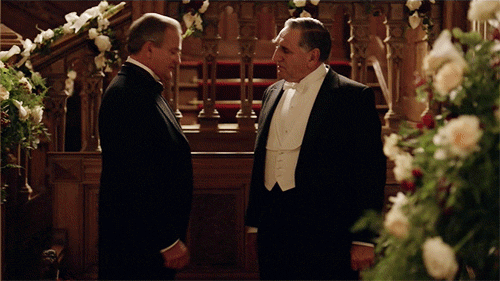
When the Downton Abbey series finale aired in the U.K. last Christmas, some fans found it a bit too cheery. “Some people liked it, some people didn’t like it because they said it was just such a happy ending for everybody,” director Michael Engler says. “My feeling about it was, it’s not that it was a happy ending for everybody, but there’s a sense that everybody has found where or with whom they belong. It’s like the right ending. … You wanted to leave the characters in a place that would be memorable and would be hopefully promising a future that you could imagine for them, that you would want for them.”
Now that America has seen the last of the Crawleys (for now), Engler and executive produce Gareth Neame spoke separately with Yahoo TV about the scenes that made us tear up (who’d have guessed it’d be the handshakes from Robert that would get us?), the moments that made the cast misty, and the sweet hug from Sybbie that wasn’t scripted.
Related: Downton Abbey Series Finale Recap: A Happy Ending
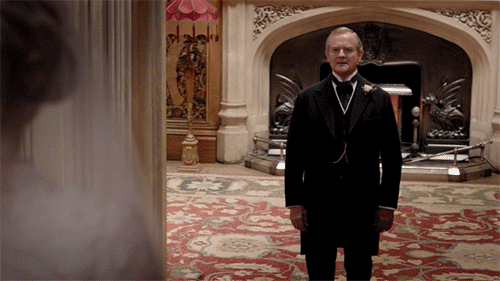
Let’s start with Lady Edith (Laura Carmichael) getting her happy ending with Bertie. As Robert (Hugh Bonneville) hilariously points out in this episode, Edith is someone who “has hardly known a day’s happiness in the last 10 years.“ As wonderful as it’s been to watch her come in to her own, it’s equally gratifying to see Robert appreciate that she’s an interesting woman. What was their pre-wedding conversation like to film?
Michael Engler: When we were rehearsing, the first time Laura came down the stairs in the full dress and veil, Hugh turned and looked up at her and he started crying. He literally just started crying. You could see he has become a kind of father figure to her, or, certainly a big brother. They had developed that kind of relationship over time, and he could just look at her and feel such pride — the same sort of pride and sadness and joy and everything a father would feel in a moment like that, of knowing that he’s not going to see her very often anymore in the same way. All of it was infused by that awareness the cast had of the show coming to an end.
What’s so great, I think, about Edith’s story is that she gets everything that everybody always expected for Mary. She gets it in the most accidental way. It was enjoying the fact that although she gets battered around by fate, this last round happened to be as good to her as the other rounds were bad to her.
Robert says something about, "Who would’ve guessed you’d make a brilliant match?” She says, “Yes, but I do love him, you know.” Marrying a man that wealthy and that powerful in your class, it’s not necessarily assumed that you have to be crazy about him. Robert says, “I know, but let me proud for just a few moments more and I promise I’ll calm down.” There’s a frankness in that. It’s the two of them acknowledging the situation, which is that she has married well. While it’s not why she’s doing it — she loves Bertie, and we all love Bertie — they both can giggle for a little moment at the fact that, on top of everything, she married well and that’s what they were raised to do. That part feels good however it comes to you — and how wonderful that it’s come to her in a genuine way.
Related: ‘Downton Abbey’ Director Talks Mary and Henry’s Romantic Moment in the Rain
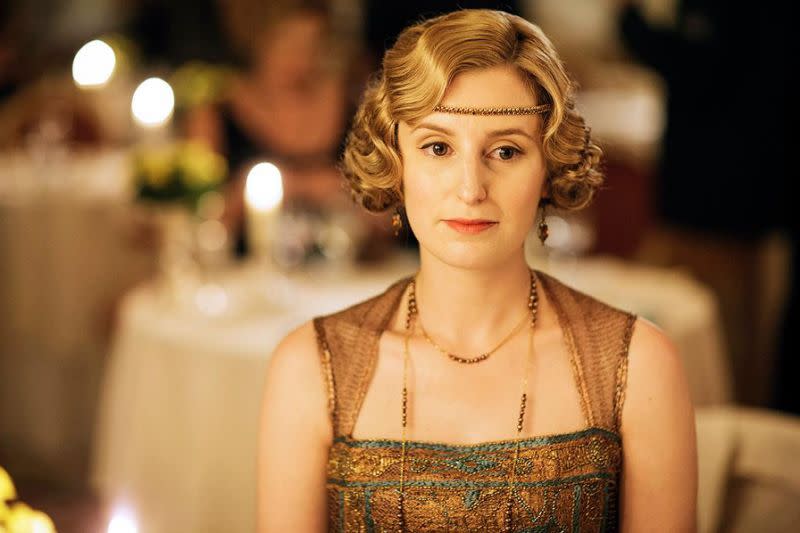
We’ve talked before about how the show approached Henry and Mary’s romance, Michael. What was the key to Bertie and Edith’s?
Engler: I think the feeling was always that their relationship was based on friendship and respect. Their romance grew out of that. It was that sense that Bertie and Edith enjoy each other. Having her pick him up in a car in that one episode set up the idea that they’ve broken all the rules. She didn’t send the chauffeur for him, or play the lady and be a passenger with him. When she brings him in to meet Marigold in the bedroom in that earlier scene, it’s all about the two of them just trying to share exactly who they are and hope that that will be what the other one wants. It turns out to be that.
Bertie’s an interesting guy because he was raised with all of that, but he never had the expectation that it would come to him — and he never seemed to care, in the same way that Edith never seemed to care. If two people who never strove for it, or hoped for it, or defined themselves by that standard both end up with it in a kind of accidental way, I think it makes you happier for them having it.
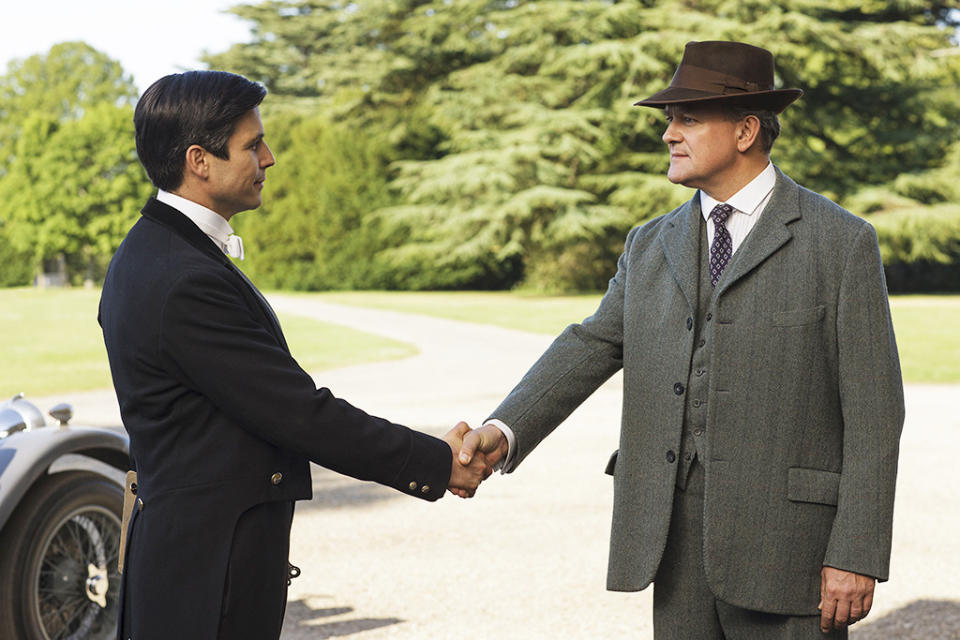
Two of the most moving moments in the episode were handshakes from Robert — he shook Barrow’s hand before he left for his new job, and then he shook Carson’s hand after the decision was made that Barrow would return to replace him as Downton’s butler due to Carson’s essential tremor. Why do you think those were so powerful?
Engler: It’s that those guys realize that a gentleman would never shake the hand of a servant. It’s not that it was forbidden, clearly, but somebody in their position would never even dream that Robert might reach his hand out. What I love about it is that in both of those situations, it’s Robert, in such a big way, reaching across the upstairs/downstairs divide to say, “Whoever we have been or will be to each other as roles, we’re also just man to man. I want you to know you’ve meant something to me.” That, I think, is one of the classic Downton experiences that, in a world that couldn’t be more codified or stratified, you have people acting in the most human, non-hierarchical ways, and that proves to be about as noble as anything can be.

Gareth Neame: Robert and Carson, one’s the king of upstairs and one’s the king of downstairs. They are similar characters in some ways, and it shows that bond between them. When Thomas goes, Robert accepts that it has been challenging at times, but none the less, they part on very good terms. For a show that people watch because they just love the characters, it feels right to, by and large, leave them in a heartwarming and positive way.
Engler: I thought perhaps maybe Edith would take Barrow to Brancaster, [but] I was very happy that it worked out the way it did because it does feel like he belongs at Downton. There’s kind of a poetry to it: the guy who lives in a jammed house and always was the thorn in everybody’s side has to deal with a life of absolute isolation, loneliness, and feeling unappreciated. When he comes back, you feel like he’s changed and knows something more about himself and the last pieces of his education or training — the growth that he needs in order to become a really great butler, which is working with the people around him and appreciating them. You sense that with him pretty quickly.

There was that great moment when little Sybbie hugged Barrow (Rob James-Collier) goodbye. It was like there was an audible “awww” from the others in the room. They seemed so touched by that.
Engler: You know what, that wasn’t scripted. She just ran and did that. There was that reaction, and then after it happened, I said, “Okay, everybody. That’s exactly what the reaction should be.” Because Rob, who plays Barrow, was always working with the children, he developed a very close relationship with them and they really liked playing with him and seeing him. It was a very similar kind of relationship to the one in the show, so a lot of that stuff didn’t even have to be acted.
Neame: I think that probably is quite realistic. The autocratic children had very strong bonds with the servants because they didn’t spend very much time with their own parents. It did feel very spontaneous. I like the fact that a bit of Sybil lives on with Sybbie.
Related: Top 12 Moments From the ‘Downton Abbey’ Cast Premiere Q&A
We’ve heard that Jim Carter (who plays Mr. Carson) got emotional filming his final scene in the servants’ hall. Was it the New Year’s Eve scene?
Engler: The final scene where they all start singing "Auld Lang Syne.” That was the last scene we shot among the servants. Very consciously, we said, “Let’s see if we can put that at the very, very end and say goodbye to everybody at once, and see what happens.” See if the awareness of doing that would infuse the quality of the scene. It did. Afterwards, people wanted to say "thank you” or “goodbye,” and there was a chance for Gareth Neame [and others] to thank the cast one-by-one for everything they did. That’s when it got extremely emotional because they were all there for the last time, that group of people.
The upstairs people worked together a lot, but they tended to pair off more in scenes or else, if they were working together, they would be sitting at a big table or in a large room broken off into little groups. The downstairs actors are almost like a little acting company themselves. They’re coming and going and running in and out of each others’ scenes, so they were all around each other all the time as part of their work down there. That was an extremely tearful goodbye.
The most joyous goodbye was when we finished the last scene in the dining room — the loudest cheer I can remember ever in a working situation, because those scenes took forever to shoot. They’re fun, in a way, but extremely tedious and required absolute discipline and patience. When that was done, cast and crew alike were thrilled to know they would hopefully not see that dining room again in costume, hair, and makeup under those lights.
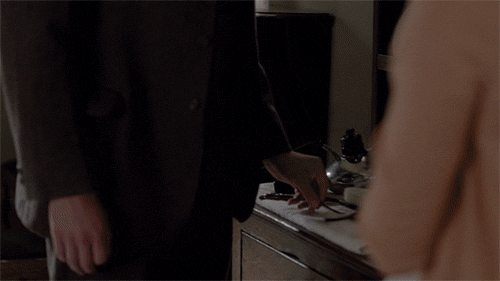
Daisy is a fan-favorite, but she made some bad choices this season. Finally, she opened her eyes to Andy and his muscles. Was that moment where he picked up a lock of her hair in Julian Fellowes’ script?
Engler: I think it came in a later draft, as part of a discussion with Julian, but it was definitely scripted. The two of them had been doing such a dance. He reaches out and she steps back, and she reaches out and he steps back. We just thought, “Without a lot more talking there, how can he just say, ‘You’re special to me?’” That felt like the way to do it — a gesture like that, that would communicate in a way that would get past all of their verbal misunderstandings, which was what he had just said in the moment before. He said, "I think we’ve been out of step. Let’s try not to be out of step.” He grabs the hair, and does it also in a way that doesn’t cause her to have to do anything or say anything in the moment, but just to really take in how he feels.
I think for Daisy, there was that sense of, “Wait a minute. Here’s this ambitious guy. He’s like me. He’s a hard worker. The people I love love him. He loves them. Why wouldn’t that be right?” As she’s becoming more aware of the world and herself, she realizes what the things are that are good for her and give her actual joy and pleasure and happiness, rather than how she imagines herself to be. It’s more about that than about, “Let’s make sure they end up happy.”
Neame: It seems to work out. But I like the way that’s just left hanging. We don’t really know what’s going to come of that.
One thing the episode wants us to know is that Robert and Cora’s relationship will remain strong. Why was that so important?
Engler: At a moment like this, when they’ve done their job and the kids are now out of the house, would that be the point at which their marriage started to feel empty or fall apart? Actually, it’s the opposite. There’s a feeling that Mary is going to take on more around the house. Cora finds a place in the community that’s meaningful for her, and Robert understands that that actually elevates his marriage, it doesn’t diminish it. He’s proud of her. You feel like, “Okay, whatever happens in this family, these two, at the base of their foundation, are always going to have a strong marriage.”
Related: ’Downton’ EP Talks That Edith-Mary Fight
Gareth, we’ve discussed the epic fight between Edith and Mary in the penultimate episode. How did you want to leave viewers feeling about their relationship?
Neame: I just felt the penultimate episode would have to be the mother of all battles. You cannot keep that up. I think we all know they’re never going to be best friends, even as adults. I was the oldest [of my siblings]. The next one down was one of my sisters, who I really didn’t get on with at all when we were kids. We’re very different kinds of people. As you get older, you learn to tolerate all that. You realize that not everyone’s the same. Also, I suppose you spend a lot less time with your siblings once you’re an adult, so you can get on just fine. That felt realistic, that they would get on fine. I always loved the sentiment that they’ve expressed in previous episodes about the fact that they have this common bond with Sybil. There’s that lovely line about, “Mommy and daddy will die off, and everyone will die, and we’ll be the only ones left that knew them and the only ones that knew Sybil. That’s something that’s really precious between us.” Julian Fellowes really captures that kind of humanity in these characters.

Was it just a given that the Dowager (Maggie Smith) would get the last line in the series?
Neame: [Laughs] We didn’t really discuss it. We just knew that she had to have the last line.
It was so nice to see her and Isobel (Penelope Wilton) scheming together.
Engler: The two of them are always fun, especially hatching a plot together. What’s funny is, I guess over time, they’ve developed a version of that relationship you see on screen. They love each other dearly, and they challenge each other more than anybody else. They both have been around and know the world so well and trust each other deeply, and also love being playfully provocative with each other. I consider one of the great blessings of my career being able to direct the two of them.
Is there anything you want to make sure fans caught in the finale, Gareth?
Neame: There’s one thing not many people picked up [in the U.K.]. It’s an element I really wanted us to do at the very end of Anna’s line when she’s holding the newborn baby. She actually calls Mr. Bates John — the one and only time that she ever calls him by his name in the whole show. We’ve always loved the fact that she only ever called her husband Mr. Bates.
Last question: Is there any update on a potential Downton Abbey movie?
Neame: There’s no formal update, but I’m not denying anything. I think there’s an appetite for it. It might well happen. I cannot confirm anything now because there’s just too many things to resolve. I think we’d like to do it.
Allen Leech, who plays Tom Branson, takes us behind-the-scenes of the series:
In Part 2 of his photo diary, he recounts filming his final scene:


